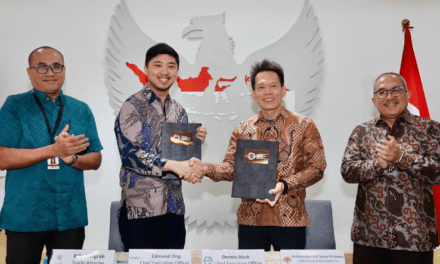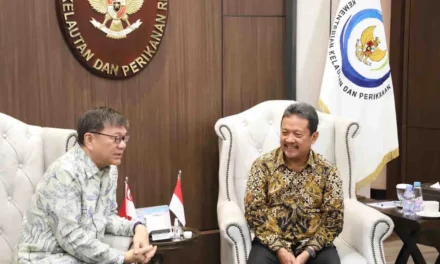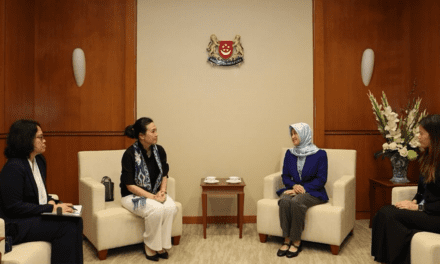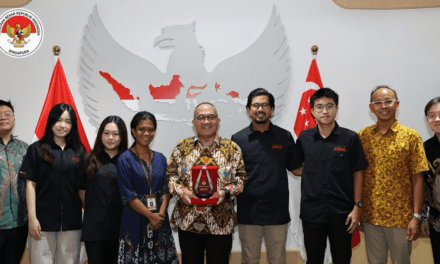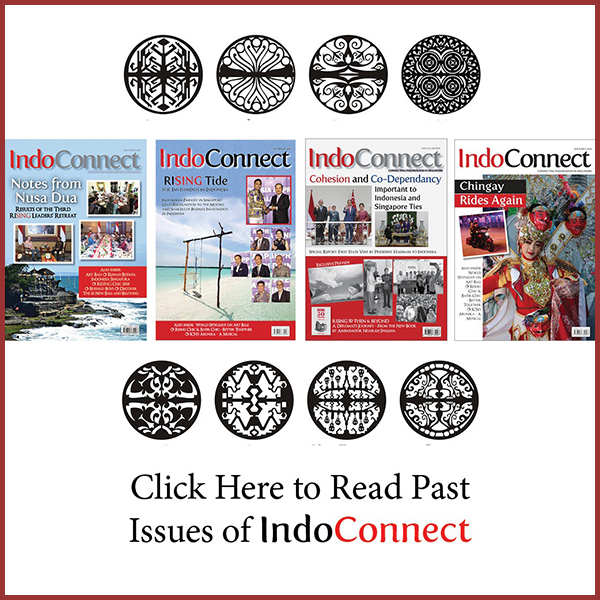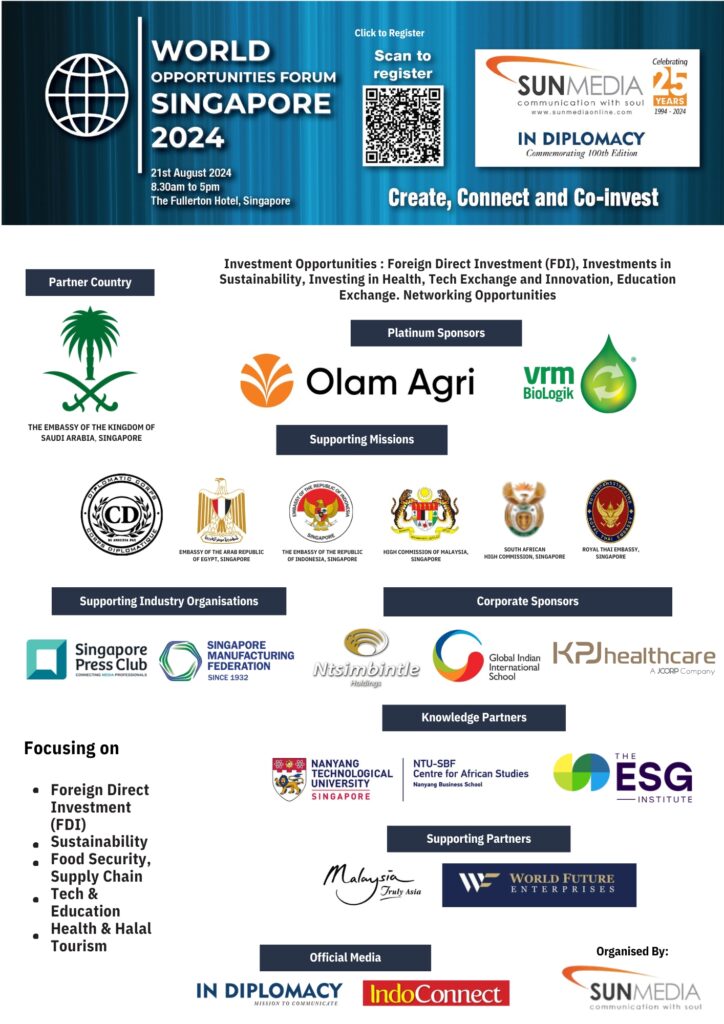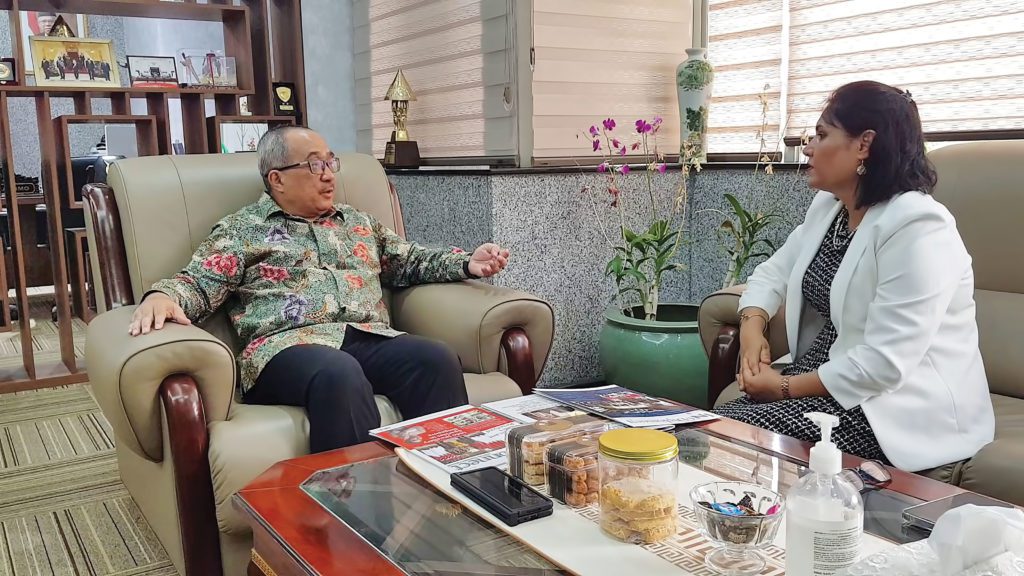
As Indonesia and Singapore celebrates their respective National Days in August, the Indonesian Ambassador to Singapore H.E. Suryo Pratomo shared his thoughts with Nomita Dhar, IndoConnect’s Editor in Chief about the latest developments between both countries
WE again meet before Singapore and Indonesia celebrate their national days. August is always a milestone month for both countries. You’ve been here for a few years now; tell us about the new initiatives taken to keep our bilateral relationship warm and happening? We have done many things to strengthen our cooperation. The most important is the relationship between our heads of state which is going extremely well. This can be seen from the expansion of our Bilateral Economic Working Groups from six to seven working groups. New is what Indonesia and Singapore can do together in renewable energy and how to reach zero emissions.
On the business level we have also made achievements. We are collaborating with Singapore’s Ambassador to Indonesia, Mr Kwok Fook Seng. We are working together and last May we invited 95 potential Singapore investors to spend three days at the site of the new capital Nusantara.
For people-to-people ties, I think it is excellent. For example, if I can use the ‘badminton diplomacy’ to illustrate this. Last month (June) I accompanied Singapore’s Second Minister for Foreign Affairs Pak Maliki Osman to meet the head of the Indonesian Badminton Association (PBSI) Pak Agung Firman Sampurna. He mentioned to Minister Maliki that Indonesia has about 58,000 national badminton players! With such a huge talent pool, the Second Minister wondered if it was possible to send 100 of them each month to Singapore to compete and train with Singapore national players to raise their standards! It is a new idea and such things are important ways to bring people together. This is something I have been trying to do during my past two-and-a-half-year tenure in Singapore to build up people-to-people ties. As close neighbours there can sometimes be problems but we can solve them as the trust and confidence between our two countries can be maintained and improved.
Orchids have always been very special to Singapore and I believe there are some initiatives about featuring orchids from Indonesia in Singapore?
The idea to hold an exhibition of orchids from the ‘East Tropics’ originated from Garden by the Bay’s management who invited several ambassadors as Indonesia, Malaysia and Singapore celebrate their national days in the same month as August, along with Thailand, which is also famous for its orchids. We are still in discussions about this and might do this between July and September. The orchids will be exhibited along with iconic examples of traditional homes from each country; from Indonesia we chose the Rumah Toraja from South Sulawesi.
Indonesia is the current Chair of ASEAN. What is your reading on the growth of ASEAN, its leverage and ability to find solutions for difficult problems like Myanmar?
Yes, Myanmar is the most challenging issue for ASEAN and Indonesia as Chair of ASEAN also consider Myanmar as one of our brothers so we listen to their views as well as get ideas for solutions from all other ASEAN members. We know that a peaceful situation is very important to bring prosperity to the people. You cannot develop a country when it is not at peace or (politically) stable. That is why ASEAN members are doing it by reaching a consensus and not getting involved (directly) in the country’s internal matters. We try to find the best ways to solve the problems in Myanmar by sharing a new approach, new ideas or maybe trying new concepts, but it is not easy.
Do you think a breakthrough is possible?
We have the experience like back in 1997 when we were involved in solving the problems after the coup in Cambodia. We are using the same approach as we did then quietly trying to solve the problems without the need for any ‘megaphone’ diplomacy going for continued mediation within ASEAN. In Cambodia we were able to bring all the factions to sit together for an informal meeting. It took a long time but, in the end, look at Cambodia today. It is politically stable and its economy continues to improve. It has to be done with all the ASEAN member countries onboard with the same mindset.

Singapore is Indonesia’s top foreign investor and you have projects like the upcoming Nusantara capital on the table; President Jokowi also came to Singapore to pitch for the capital city project and left Singapore with many letters of intent. What is the latest on Singapore investments and investors involved in this project?
If you follow the many forums, seminars and workshops held here they all realise Southeast Asia is the most dynamic economy in the world. There’s still room for growth with Indonesia registering 5.3% GDP. The first quarter 2023 GDP figure has already exceeded 5% with Singapore investing US$4.3 billion. If you compare the first quarter US$4.3 billion figure against the whole of last year’s total of US$13 billion, I am confident the level of Singapore investment in Indonesia will be more than last year.
Another factor for higher investments from Singapore this year is the development of Nusantara. This is the biggest single project in the region valued at US$32 billion. We need to build up the capital city which is four times the size of Singapore. When President Jokowi was in Singapore in June he was scheduled to have a tête-à-tête with Prime Minister Lee Hsien Loong for 10 minutes but in the end it took more than an hour!
After the meeting President Jokowi explained that they shared many things including politics, the economy and he had asked if Singapore was willing to support Indonesia in building the capital. That is why in the press conference that followed, Prime Minister Lee mentioned very clearly that Singapore will support the development of the new capital and President Jokowi also said he will ask Indonesia businesses to also invest in Singapore.
Earlier in March, after the Indonesia– Singapore Leaders’ Retreat, I joined up with Singapore Ambassador Fook and we organised the trip for the 95 business people in May to visit Nusantara. That was when President Jokowi shared he planned to do a series of roadshows to three countries – Hong Kong, Singapore and the UAE – devoted to the development of the capital. But the first country he wanted to go was to Singapore. So he has been to Singapore twice in three months! His second visit on 7th of June is to specially explain to Prime Minister Lee about the new capital.
President Jokowi was not only here to invite Singapore and global businesses to invest just in the new capital, but also to share that the opportunities for investment in all of Indonesia are huge. In the last five years President Jokowi has set up programmes for the down streaming of our industries. We also have very ambitious plans to develop our renewable energy resources to produce a potential of more than 440 Gigawatts of power from renewable energy.
Next month we have plans to take Singapore businesses on a trip related to healthcare and health centres in Indonesia as we are also reforming Indonesia’s health industry.
Yes, many Indonesians come to Singapore for health reasons. President Jokowi in a speech given during his recent visit to Singapore also mentioned that he would like some of Singapore’s universities to work with Indonesia. Has there been any progress on that front?
Yes, we are still working on that and in this sector, President Jokowi has also set up a new Special Economic Zone (SEZ) specialising in health in Bali. A large hotel in Sanur underwent renovations to become a world-class international hospital and it will be the first Health SEZ in Indonesia.
Ambassador, also in terms of trade, how has the story been between the two countries?
Singapore is very dependent, specially for food, from other countries so it has to try to find more sources. COVID-19 gave us the opportunity when Malaysia instituted a chicken export ban in May last year. For the first time, Singapore started accepting our frozen chickens in July 2022. It was also at this time during a Leaders’ Retreat at a meeting discussing bilateral matters, President Jokowi asked Prime Minister Lee Hsien Loong about the possibility of exporting live chickens to Singapore. Last month the first consignment of live chickens from Bintan arrived here. We also now have a licence from the Singapore Food Agency to export eggs to the Singapore market. There are now many food products coming in from Indonesia including manufactured food and beverages products now having access to Singapore.
“Last year registered the largest number of Indonesian visitors to Singapore – 2.2 million. This makes Singapore Indonesians’ most favourite place to visit”
How is it on the tourism front? Are there more Singaporeans going to Indonesia and are there any new areas that have opened up for us to explore like in the 10 New Bali book that President Jokowi promoted?
I think in tourism, Singapore must give thanks to Indonesia because last year we registered the largest number of Indonesian visitors to Singapore – 2.2 million. This makes Singapore Indonesia’s most favourite place to visit. During the same period Indonesia received less than one million visitors from Singapore. But we are working very hard to strengthen the connections between Singapore and Indonesia. In fact, next Saturday I will be at a new resort destination – Nirup Island – which is only a 15-minute boat ride from Sentosa. I will be there at the official opening of the harbour by the Indonesian Minister of Transportation Bapak Budi Karya Sumadi. It is billed as the ‘New Maldives of Batam’ so I will get to see it for myself.
National Days are very close to everyone’s heart and you have a large diaspora here. How do you engage them and what is your national day message for them?
I’m very lucky as I have Pak Juviano Ribeiro, the new head of department for Information, Social and Culture. He is very active engaging with the diaspora. And I have told Pak Juvi please utilize our embassy as we have very nice facilities and there is a gathering here almost every weekend organised by Pak Juvi and the team from the labour attache department. We also have many other groups from the Indonesian diaspora made up of young Indonesian professionals that come here for activities. Just last week there was an event here (the embassy) where I rode a bicycle joining a group of 120 other riders from more than ten diaspora groups!
You still have so many associations?
While they belong to their own groups, every three months we organise a big gathering and everyone from all the other groups join together. They are very active. We have about 200,00 to 250,000 members of the Indonesian diaspora in Singapore.
As of last week, also for the first time, Singapore’s Ministry of Health is admitting Indonesia nurses to work in Singapore. The first batch of 21 nurses arrived last week to work in public hospitals here. We have sent nurses to Japan but this is the first time to Singapore. It was not easy as they are assessed on their education, nursing education and vocational training as well as language proficiency. Thankfully all 21 passed the assessment and after this hopefully many other Indonesians will have the opportunity to serve as a nurse here.
One last question on your digital collaboration and honing young talent that’s something very unique that our two countries are doing. So what’s on that side?
We are pleased about it because EDB (Singapore’s Economic Development Board) is also very active in setting up this cooperation with Indonesia’s Coordinating Ministry of Economic Affairs. They are working together promoting the Nongsa Digital Park in Batam. We have already set aside an area that could become the Digital Park of Indonesia and Singapore with data centres being set up there.
Two months ago I went to Batam to open the IBM Academy of Hybrid Cloud and AI. They will be training 150,000 Indonesians a year in IT. There is also an Apple Developer Academy in Batam. The purpose of the academies is to prepare enough of an Indonesia digital workforce.
This is a huge opportunity for ASEAN with estimates that the grouping’s digital economy can be developed to more than US$200 billion. And the biggest of these markets is in Indonesia.
And your mobile penetration is one of the highest in the world. So much content have been created and new business startups have come up.
That’s right. Last month the Indonesia government launched a special satellite SATRIA 2 dedicated only for the internet in Indonesia. The government and President Jokowi have already decided that the digital economy is one of the pillars needed by the nation to face the challenges of the future. That is the reason we must be prepared with our human capital. And that is why we are developing and working with the best academies in the world.
Also in Batam we have also setup Infinite (Studios) at Nongsa Digital Park and it’s like the Hollywood of Indonesia. You should see the facilities we have there. Many movies shown on Netflix and programmes on Singapore television are produced there.
As I mentioned earlier there are seven working groups and one of them is specially working on Batam, Bintan and Karimun (islands). They are all close, only 30 minutes away by ferry from Singapore.
We have asked so many questions. Things move because good human beings are on important chairs; we talk to each other and we facilitate life, oil the economy and change lives. You are one of them. I want to know how has your tenure been in Singapore so far. What are your most favourite places, your most favourite food and people.
For food here, the first is chicken rice and second is Indian food where there are many Indian restaurants at Race Course Road. Also here at Dempsey Hills where there is a good Indian restaurant. Many Indonesians also like the fish head curry dish.
What is the one food you would like to promote from Indonesia in Singapore?
There are too many! But there is one dish that has started to catch on in Australia – it is Nasi Bungkus (rice wrap). It is very traditional and like Indian food it uses a banana leaf to wrap a small amount of rice and other side dishes from Indonesia. President Jokowi and my minister of foreign affairs were in Australia and visited an Indonesian restaurant but there was no place to sit; so they ordered Nasi Bungkus – as it is small enough to go as a takeaway and be eaten anywhere!

